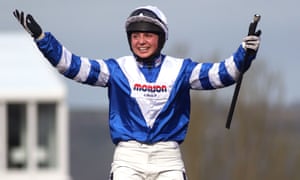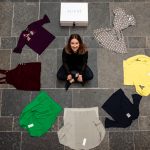
Pick up any newspaper from the last five years and you will see countless interviews with sportsmen, and pictures running alongside in which they look thoughtful, determined and serious. Once upon a time, the only way a sportswoman would be featured was smiling, wearing her “everyday” clothes or a pretty dress .
But recent evidence suggests that women are no longer being treated as a sparkling adornment to sport; the mood is shifting – and it’s happening quickly. Almost every day there is a new milestone – from victory at the Cheltenham Festival for Bryony Frost, the first woman to win a Grade One race at the meeting, to Adidas’s announcement that, for the first time ever, the winning team at this summer’s women’s football World Cup in France, would be paid the same bonus as their male counterparts.
Perhaps most significant in this country is news of Barclays’ sponsorship dealover three years of the FA Women’s Super League – proof, in the form of a £10m cheque, that women’s sport is not something brands are doing just to look good. As ever, where big-name sponsors go, others will follow, keen not to be left behind and miss out on a slice of the pie.
In the future, we may look back through the Brexit fog of the last few months, and realise that something special was happening in women’s sport that would positively affect generations to come. It is important to appreciate the distance we still have to travel, though. Sport England’s Active Lives survey last week showed that schoolgirls were significantly less likely than boys to say they enjoyed or felt confident about doing sport and physical activity.
Watching Bryony Frost doing an emphatic triple fist-pump as she crossed the line to win the Ryanair Chase will hopefully inspire girls, leading to a more equal balance in sport between the sexes. Horse racing, a sport where male and female riders compete as equals, provided they are given the same opportunities, could pave the way.
Earlier, Frost’s enormously endearing dad, Jimmy, had said, “I tell Bryony: when people say ‘are you strong enough?’ you say ‘I ride the horse, I don’t carry it.’” It is this sort of attitude that breeds winners. Later that day, a former jockey, enthused by Frost’s ride, told me that one day she would join AP McCoy and Peter Scudamore in the ranks of champion jump jockeys; another said she had the best balance of any rider, male or female.
In punditry, too, the most exposing of roles in sport, women now regularly appear alongside men. The performance of Alex Scott and Eni Aluko at the Russia World Cup last summer, for BBC and ITV respectively, built their reputations so that Scott is now one of the leading pundits in British football. The three most senior positions in British football are either unoccupied or soon will be – the chief executives of the FA, the Premier League and the English Football League.
It was enormously disappointing that Susanna Dinnage pulled out of the Premier League role after her appointment was announced. But it showed, at least, that female candidates are being considered for the most powerful positions in sport.
Perhaps the biggest indicator that women’s sport is being treated as sport in its own right is the appearance of negative headlines.
There was a five-game ban for Sheffield United’s Sophie Jones last week after she racially abused a rival player by making monkey noises. The striker released a remarkable statement in response, accusing the FA of running a “kangaroo court” and claiming that she would retire from football immediately. Then, hordes of Paris Saint-Germain fans were denied entry to a Women’s Champions League match after weapons, including knives and knuckledusters, were found on a coach taking fans to the quarter-final tie in London.
It is vital that these moments be recorded, too. Having poor performances remarked upon, as well as the great achievements, is what women athletes want because that means equality; it means that women’s sport becomes, simply, sport.
[“source=theguardian”]






